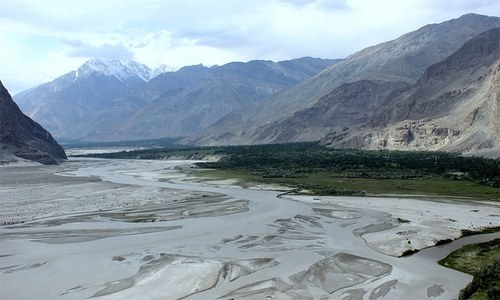LAHORE: An eight-member delegation of Pakistan’s Commission on Indus Waters will leave for New Delhi on Monday for a two-day meeting of the Permanent Commission on Indus Waters to discuss with their Indian counterparts Pakistan’s objections to the design of Pakal Dul and Lower Kalnai hydroelectric plants/projects and other issues.
The meeting is scheduled for Tuesday and Wednesday. The last meeting took place in August 2018 in Lahore. Officials said the gap between the two meetings was caused by the coronavirus pandemic. After the 2018 meeting, a Pakistani delegation was invited by India to inspect the sites of the hydroelectric projects being constructed by India on Pakistani rivers.
An official, however, claimed that in addition to the pandemic, India’s unilateral decision to change the special status of occupied Kashmir was another factor responsible for the long gap between the two meetings.
Islamabad to raise objection to construction of two controversial Indian power projects on Pakistani waters
The next week’s meeting is seen as an important development in the wake of recent statements by Prime Minister Imran Khan and Army Chief Gen Qamar Javed Bajwa in which they reiterated Pakistan’s position on relationship with India and called for resolution of the disputes through dialogues. Both the Pakistani leaders have nonetheless asked India to take the first step by agreeing to resolve the Kashmir issue according to the wishes of its people.
The Pakistani delegation will be led by Indus Commissioner Syed Mehr Ali Shah and that of India by his counterpart P.K. Saxena.
According to agenda of the meeting, the Pakistani delegation comprising officials of the Indus Water Commission, Water and Power Development Authority, Attorney General Office, Meteorology, Irrigation and other departments concerned, would discuss Pakistan’s objections to the design of 1,000MW Pakal Dul and 48MW Lower Kalnai hydroelectric plants (HEP), supply of information/data of the new projects by India on western rivers, flood data arrangements for the forthcoming flood season, programmes of meetings and tours of the commission, two recent new run-of-river hydroelectric plants — 19MW Durbuk and 24MW Nimu-Chilling — and any other issue with the mutual consent of both the commissioners.
“Under the Indus Waters Treaty (IWT), at least one meeting of the Permanent Commission on Indus Waters should be held each year alternately in India and Pakistan. However, we can have more meetings each year since the treaty doesn’t bind us in this regard. Moreover, the tours/inspections from both sides are also paid by both sides to various sites,” Pakistan’s commissioner explained. “We will not visit to any project site, as we will only have meeting with our counterpart in India,” he said.
Meanwhile, the Foreign Office, while confirming the Delhi meeting, said that under the provisions of the IWT 1960, said the Permanent Indus Commission was required to meet at least once a year. However, the meetings could not be held regularly because of tensions between the two countries, it added.
“A host of issues under the Treaty, including our objections to the designs of Pakal Dul and Lower Kalnai hydroelectric plants, supply of information on new Indian projects on the western rivers and supply of flood data by India, will be discussed,” the FO spokesman said at a briefing.
The construction of controversial Pakal Dul Dam is currently under way on a tributary of the River Chenab by the Indian authorities in Kishtwar district of Jammu and Kashmir.
In last meeting held in Lahore in August 2018, Pakistan had urged India to entertain the objections it had raised over the construction of Pakal Dul and Lower Kalnai hydropower projects on Chenab. It conveyed in categorical terms to the visiting Indian team that Islamabad would approach the international forums defined in the IWT in case New Delhi failed to accept the requests as narrated in the detailed objections. Pakistan also made it clear that it would have no option but to use international forums — appointment of neutral experts, taking the case to international court of arbitration, etc — in case India failed to address its concerns that were absolutely genuine and could be resolved amicably.
Pakistani authorities had also asked the Indians to reduce the height of Pakal Dul’s reservoir up to five metres, maintain 40-metre height above sea level while making spillways’ gates of this project, besides clarifying the pattern and mechanism for the water storage and releases.
Similarly, Pakistan raised some technical concerns over the design of the Lower Kalnai hydropower project, requesting India to address them at the earliest.
Finally, India agreed to get the sites of Pakal Dul and Lower Kalnai projects inspected by Pakistani experts. It also assured Pakistan of taking up its objections/concerns over the two projects seriously by resolving them amicably in the light of technical memorandums to be prepared and exchanged by the two countries in the next meeting to be held in New Delhi.
Later in February 2019, Pakistani experts headed by the Commissioner on Indus Waters had inspected four hydropower projects at Chenab basin in India, including Pakal Dul, Lower Kalnai, 850MW Ratlay and 900MW Baglihar dams. The construction work on Pakal Dul dam, which was earlier stopped, had resumed at that time.
Published in Dawn, March 20th, 2021
















































